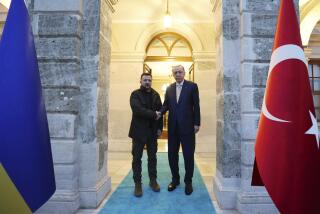Greece, Turkey OK U.S. Plan for Cyprus Talks
- Share via
WASHINGTON — The leaders of Greece and Turkey have agreed in principle to attend a peace conference aimed at ending a dispute that has left the Mediterranean island of Cyprus divided for 17 years, the White House announced Friday.
The planned session in the United States next month marks what officials described as a historic opportunity to find a settlement for an enduring crisis that has seen the island partitioned with mines and barbed wire.
The tentative agreement by the prime minister of Greece and president of Turkey to set aside a deep-seated enmity on the issue follows intensive diplomatic efforts by U.S. envoys and a public plea for peace from President Bush in his visit to the region last month.
The proposed meeting will not take place, however, unless representatives of the two countries can agree in coming weeks to narrow the differences that remain between them. But officials involved in the discussions expressed optimism, and a senior U.S. official declared: “This is a very, very positive step forward.”
In Athens, a Greek government spokesman expressed “satisfaction” with the development, the Associated Press reported. The Turkish Foreign Ministry reserved official comment, but a Turkish official in Washington hailed what he called “a chance for a final solution.”
In announcing the move, the White House mentioned only Prime Minister Constantine Mitsotakis of Greece and President Turgut Ozal of Turkey as participants in the conference, which will be chaired by U.N. Secretary General Javier Perez de Cuellar.
But a senior Administration official said later that the United States “fully expects” the session also to include George Vassiliou, the president of Cyprus’ Greek-backed government, and Rauf Denktash, the leader of the breakaway Turkish Cypriot regime in the northern third of the country.
Although they are military allies in the North Atlantic Treaty Organization, Greece and Turkey have remained bitter rivals over Cyprus, where religious and ethnic rivalries between Greek and Turkish communities for centuries have left the island riven by violence and mistrust.
Cyprus won its independence in 1960 but has been divided since 1974, when Turkish forces invaded the island in response to a Greek Cypriot coup. Those forces maintain a Turkish military presence in the secessionist north to protect a declaration of independence that only Turkey recognizes. All previous attempts to mediate the dispute have failed, and a 2,300-member U.N. force remains in place to keep the peace.
The United States long has kept its distance from the contentious dispute. But it has interjected itself forcefully into the conflict in the wake of the Persian Gulf War, in which Ankara and Athens were allies in the coalition against Iraq. And Bush made clear in his visits to those capitals last month that a settlement would be a goal of his postwar diplomacy.
In taking the unusual step of announcing the agreement between two foreign leaders, the President made further evident his personal interest in an accord. He hailed the step, like those toward a Middle East settlement, as one of the further “opportunities for peace” that have resulted from the multilateral cooperation in the Persian Gulf.
In contrast to the Middle East, where the United States has put forth a series of peace plans, Bush has said only that he wants to be a “catalyst” for a settlement over Cyprus.
For that reason, Administration officials said Friday that they advocate no particular blueprint for peace on the troubled island. And with differences between the two parties still many and contentious, Bush made clear that a peace conference could be convened only if “adequate progress” was made in bridging the gap.
On both sides, official have proposed that a united Cyprus take the form of some sort of confederation that would leave the Greek and Turkish communities living in separate territories.
But a wide range of issues involved in such an arrangement remains a source of fierce disagreement. The issues include vexing questions about the size of the respective territories and guarantees about their political independence and military security. A further source of controversy lies in the demands of Greek Cypriots who fled the north after the Turkish takeover and now demand that they be allowed to travel to or even resettle in the region.
A Bush Administration official said that if Greece and Turkey now can succeed in narrowing some of those differences, the goal at the U.N.-sponsored peace conference would be to draft at least the outline of a settlement that could bring peace to Cyprus.
In Cyprus, the government on the Greek Cypriot side of the island pledged to work to overcome any problems and welcomed the announcement “as indicative of the interest of the United States and of President Bush personally in the solution of the Cyprus problem,” the Associated Press reported. There was no immediate response from the breakaway Turkish regime.
Administration officials and representatives of Greece and Turkey said that much of the credit for bringing about the peace conference belongs to Nelson Ledsky, a special State Department trouble-shooter on Cyprus who has spent the last week in intensive consultations with officials in the two capitals.
In the past, Turkey and Greece have promoted opposing formulas for talks on the conflict. While Ankara has insisted that the breakaway Denktash regime be represented in any conference, Athens has steadfastly resisted any plan that would elevate the Turkish Cypriots, who are supported by 35,000 Turkish troops, to equal status with the internationally recognized Republic of Cyprus.
Jehl reported from Washington and Williams from Nicosia, Cyprus.
More to Read
Sign up for Essential California
The most important California stories and recommendations in your inbox every morning.
You may occasionally receive promotional content from the Los Angeles Times.













